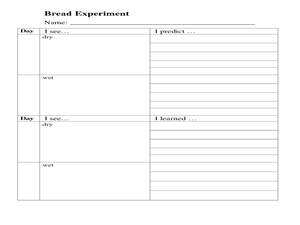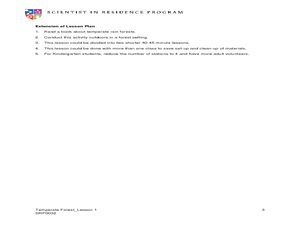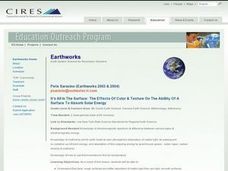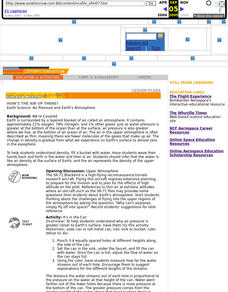Curated OER
Debate on China's One Child Policy
High schoolers learn about China's One Child Policy. They read an article about a specific family's experience under the policy (not included) and research and explain the key points of the policy. They assess the pros and cons in a...
Curated OER
The Nine Planets
Sixth graders examine and investigate the solar system. They participate in a Webquest, and create a Powerpoint presentation that is meant to be a research guide to help alien visitors find a suitable habitat in the solar system.
Curated OER
Why Do We Have Day And Night?
Second graders demonstrate knowledge and appropriate use of hardware components, software programs, and their connections. After a lecture/demo, student groups utilize raisins and apples to demonstrate day and night. They put togethre a...
Curated OER
Voyage to the Planets
Students examine the planets in the solar system. In this planetatry activity students complete a project using a WebQuest program.
Curated OER
World's Most Dynamic Force
Young scholars explore the Earth's forces. They review an assessment task and its accompanying rubric. They classify ten items as long-term or short-term interactions of the Earth's components and rank the destructive impact of the...
Curated OER
Exploring Marine Objects
Students identify the sources of water on Earth. In this life science lesson, students list the different plants and animals that live in the ocean. They explore marine objects in the lab and draw them.
Curated OER
Atmosphere Molecules
Students use foam packing pieces to represent molecular positioning inside the four layers of earth's atmosphere. This lesson help students visualize that molecules become thinner as one ascends higher in the atmosphere.
Curated OER
Water, Water Everywhere
Studetns view a terrarium with water droplets on the wals. They discuss the ways the water could have got onto the wall of the terrarium. Learners design an experiment to duplicate the process. They describe the patterns form their data...
Curated OER
Investigating the Compost
Students are introduced to the concept of biodegradability. In groups, they use the internet to research the types of materials that affect the process. They collect materials from their local community and develop an experiment to test...
Curated OER
Weather Whys- Cloud Watching Journal
Learners examine how natural processes change the earth by identifying their local water cycle. Individual students complete a cloud journal over a specific period of time. They observe clouds daily and take photographs of the clouds...
Curated OER
Erosion in Different Soils [Erosion Races]
Fourth graders review how erosion can happen by wind, water, and gravity which they studied in previous lesson plan. They attempt to discover if all soils erode at the same rate. In small groups, 4th graders experiment with three...
Curated OER
Predicting the Growth of Microorganisms
Students determine where microorganisms might be found around their school. In this scientific investigation lesson plan, students collect cultures from various locations and place these in petri dishes. They incubate the cultures to...
Curated OER
Forest Decomposition
Young scholars explore decomposition. Students define and describe components of the decomposition process. Young scholars make a composter in a terrarium. Students record observations and changes weekly, drawing conclusions about...
Curated OER
Atmospheric Processes - Conduction
Students explain the process of conduction using a molecular explanation, and explain how different materials conduct at different rates.
Michigan Sea Grant
Food Chains and Webs
Starting with a simple food chain, young scientists interpret the difference and interrelatedness between herbivores, carnivores and producers. They answer questions related to cause and effect of food chain disruptions, including the...
Curated OER
Exploring Forest Objects
Students explore the forest. In this ecosystems lesson, students rotate through sensory activity centers, brainstorm, and read about temperate forests.
Curated OER
Global Water Cycle & Heat Flow
Students experiment to discover how different variables affect the water cycle. They do hat flow experiments and construct a computer heat flow model.
Curated OER
It's All In The Surface: The Effects Of Color & Texture On The Ability Of A Surface To Absorb Solar Energy
Ninth graders examine how dark surfaces absorb more light than light surfaces. They perform an experiment that compares various surfaces abilities to absorb heat, then record and analyze the results.
Curated OER
How's the Air Up There?
Young scholars experiment with soda cans and water to discover why air pressure is greater closer to Earth's surface.
Curated OER
CO Buildup City
High schoolers conduct a controlled experiment. They collect data in an organized manner. Students analyze data to reach a conclusion and communicate findings. They explain how city size, temperature, and pollution is related to the air...
Curated OER
Geology of Yosemite
Students are shown slides of Yosemite and explore how the valley was formed by performing an experiment. Instructions on how to set up the lab are included. They can be assessed orally or by writing a report on the outcome of the lab.
Curated OER
Stream Chemistry Monitoring
Students become familiar with real-world gathering of chemical data. The experience how the science is done: the nature of analysis, data collection, interpretation, and presentation. They study a nearby body of water for their experiment.
Curated OER
Remote Control
Students explore and evaluate several distance learning Web sites. They defend whether or not they would like to participate in the distance learning experience by either writing a proposal for including this distance learning project...
Curated OER
Is Dilution the Solution to Pollution?
Students explore the different types of pollution. they conduct experiments using dye mixed with tap water to measure the levels of dilution. They discuss at what point the dye (pollution) would be diluted enough to be safe to drink.
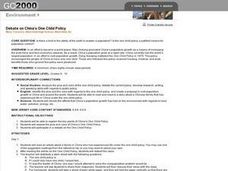

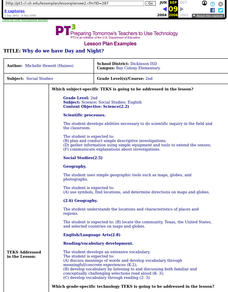
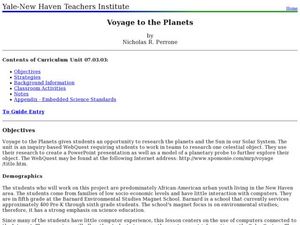

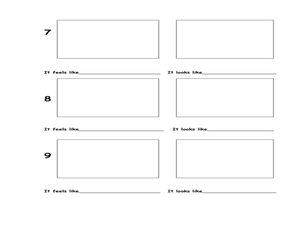
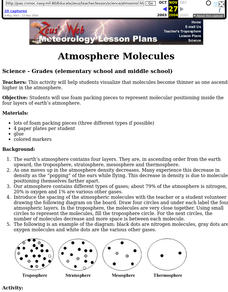


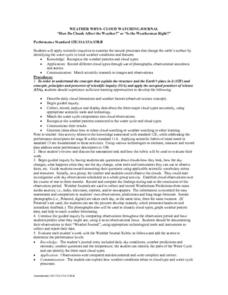
![Erosion in Different Soils [Erosion Races] Lesson Plan Erosion in Different Soils [Erosion Races] Lesson Plan](http://content.lessonplanet.com/resources/thumbnails/140405/large/cgrmlwnvbnzlcnqymdezmdmyos01nde3lxfmmzy0dc5qcgc.jpg?1414240121)

